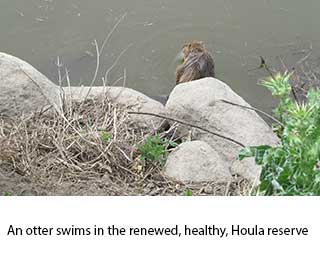|
Before long, Israelis recognized that this complex environmental engineering project was a disaster rather than a feat. The acidic soil was unfit for agriculture. The peat kept self-combusting. Nitrogen compounds, sunken in the marshes for thousands of years, were now released into the Sea of the Galilee, contaminating the water, killing fish and increasing the growth of unwanted seaweed. Flora and fauna, some of them unique to the marshes, were demolished, and several species became extinct. An important habitat for migratory birds was destroyed.
The good news is that in the early 1990s, after years of damage and remorse, the Israeli government and the Jewish National Fund, the same entities that led the campaign to dry the Houla, decided to re-flood it. The success was immense. The birds returned, as did some species that were presumed extinct. With them came the tourists. Today the Houla is a birdwatchers' paradise. It boasts more than 200 species of birds. Hundreds of thousands of migratory birds stop here on their way between Europe and Africa. Due to smart engineering and some feeding tricks, tourists can see and photograph huge cranes and storks, in the thousands, from a very short distance, only a couple of hours' drive north of Tel Aviv.
I visited the Houla wetlands during Passover with my family. The migratory birds have already flown northwest, leaving behind fish and large otters. Still, the marshes were flooded two weeks ago by Israeli tourists on bicycles and golf carts. The very Israeli lingual mixture of Arabic, Russian and Hebrew in various accents, punctuated by a symphony of cellphone ringtones, filled the placid paths and the picnic areas.
It was a celebration of the beautiful Israel.
It was also a celebration of the reversibility of folly.
Israel is turning 65 on Tuesday, and there is so much to celebrate. For a small country that faces a multitude of complicated challenges, Israel is a success story. But successful countries - like successful people - are not immune to folly.
In 1967, Israelis were filled with pride when they conquered the land of the Bible. The return to the land of the Jewish forefathers was a fulfillment of a Zionist ethos.
But as the conquest of the Houla "wilderness" turned disastrous, so did the conquering of the West Bank. So much so, that today most Israelis realize that for their country to survive as a Jewish state that is also a democracy, it must rid itself of the occupation of the West Bank. Most Israelis today realize that for them to achieve long-term independence, real independence, they must secure independence for a Palestinian state in the West Bank and the Gaza Strip.
Most Israelis recognize that although the West Bank is the land of the Bible, holding on to it in perpetuity is an increasingly unbearable albatross around Israel's neck.

I was in Israel days after President Obama's visit. Many Israelis were still talking about the historic speech he gave in Jerusalem, in which he reminded Israelis of the toll they are paying for the occupation. The President's speech was not transformative - nobody expected it to usher in a new era in Israeli-Palestinian relations. But it definitely resonated in Israel. As Maariv's Nadav Eyal recently wrote: "Obama's speech, in a brief look back, was an extraordinary event because it was intended to elicit an internal reaction in the Israeli discourse." Eyal's takeaway of the President's message was this: "Since denying our existence is tantamount to denying the existence of 'the earth beneath' and 'the sky above,' as the president put it--Israel has to think how it is moving forward. You will stay here, the president said, you're not going anywhere; now, what are you going to do with all this?"
President Obama also reminded Israelis that despite all their accomplishments, they are not truly independent.
The future of Israel as a Jewish state and a democracy depends on demographics. "Given the demographics west of the Jordan River, the only way for Israel to endure and thrive as a Jewish and democratic state is through the realization of an independent and viable Palestine," the President correctly stated.
The future of Israel depends on its ability to function as a member of the family of nations. "Given the frustration in the international community, Israel must reverse an undertow of isolation," the President said.
Israel's current security doctrine makes it primarily depend on military technology. "And given the march of technology, the only way to truly protect the Israeli people is through the absence of war - because no wall is high enough, and no Iron Dome is strong enough, to stop every enemy from inflicting harm," President Obama said.
Israel's legitimacy depends on its ethical conduct. "The Palestinian people's right to self-determination and justice must also be recognized," The President said, "Just as Israelis built a state in their homeland, Palestinians have a right to be a free people in their own land."
"Israelis have built something that few could imagine sixty-five years ago," President Obama stated. He ended his speech by saying: "As a man who has been inspired in my own life by that timeless calling within the Jewish experience - tikkun olam - I am hopeful that we can draw upon what's best in ourselves to meet the challenges that will come; to win the battles for peace in the wake of so much war; and to do the work of repairing this world."
We at APN consider President Obama's call for action as being directed not only at Israelis but also at us, those who know how crucial is a tikkun for Israel, a remedial intervention, which will - at long last - let it live in peace with its neighbors.
On this sixty-fifth Israeli Independence Day, let us commit to redouble our effort to reverse the folly, to make Israel truly independent, free of the shameful, self-destructive burden that the occupation is.
Thank you,

Ori Nir

